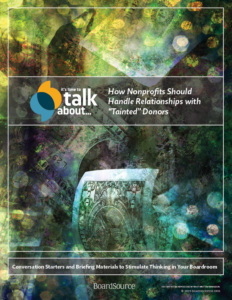It’s Time to Talk About…“Tainted” Donors
How Nonprofits Should Handle Relationships with “Tainted” Donors
The question of whether to reject funding from wealthy donors with tainted reputations is an issue that nonprofits have grappled with for generations. This topic has garnered more widespread public attention in recent months, largely due to decisions by the Metropolitan Museum of Art and other museums to reject donations from the Sackler family because of the family’s ownership of Purdue Pharma, the privately-held pharmaceutical company that produces OxyContin, one of the most common drugs involved in prescription opioid deaths.
A nonprofit board must weigh competing factors when considering its decision on this issue. Some boards may choose to decline these donations because of misalignment with the mission and values of the organization and the associated “reputational risk” of acceptance. Other boards may choose to accept the donations because in their assessment, the potential impact of the funds to serve the public good exceeds the potential damage to the organization’s reputation or the impact of declining the funds as a “symbolic statement” against the tainted donor.
We believe it is incumbent upon boards to make prudent, well-informed decisions when faced with these sensitive, nuanced scenarios, and ask you to consider the following questions to prepare for the possibility of your own board finding itself in this position.
- Does your board have a written, well-defined gift acceptance policy? If so, has this controversy caused you to re-examine (and perhaps revise) your policy?
- Does your board have a written, acknowledged statement of values? To what extent could an individual infer something negative about your level of commitment to your values, based on your decision to accept a gift from a particular donor?
- Can you envision a scenario in which your board would accept a gift because the value of the gift in service to your audience and/or the public good may “outweigh” the degree to which the donor is tainted or the potential damage to your organization’s reputation?
- What are some of the ways that your board can govern its gift acceptance practices in order to minimize the likelihood of making an unwise decision in this situation?
Articles & Readings to Stimulate Thinking
This set of materials and readings has been assembled to stimulate thinking in your boardroom.
The Met Will Turn Down Sackler Money Amid Fury Over the Opioid Crisis
This May 15, 2019 piece in The New York Times reports on the Metropolitan Museum of Art’s decision and how it reflects the growing outrage over the role the Sacklers may have played in the opioid crisis, as well as an energized activist movement that is forcing museums to reckon with where some of their money comes from.
When Your Money Is So Tainted Museums Don’t Want It
In this May 16, 2019 opinion piece in The New York Times, author Anand Giridharadas shares his thoughts on why nonprofits should not allow themselves to be used by the wealthy to scrub their consciences.
Nonprofits Shouldn’t Be So Quick to Reject Funds from Tainted Donors
In this April 26, 2019 opinion piece in the Washington Post, David Allen, vice president of a fundraising and management consulting firm for nonprofits, encourages nonprofits to not put the goal of shaming wrongdoers above the goal of furthering the common good and to take a nuanced, thoughtful approach to the ethics of gift acceptance.

